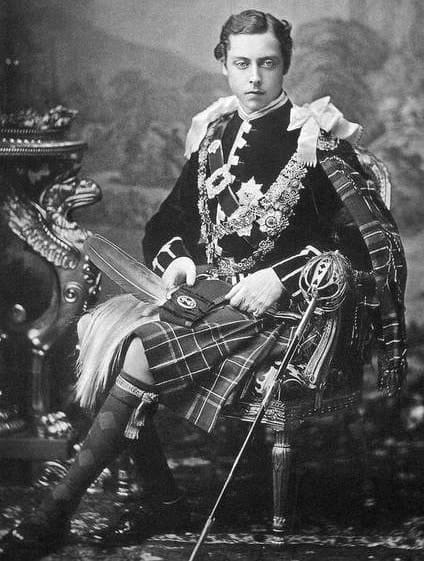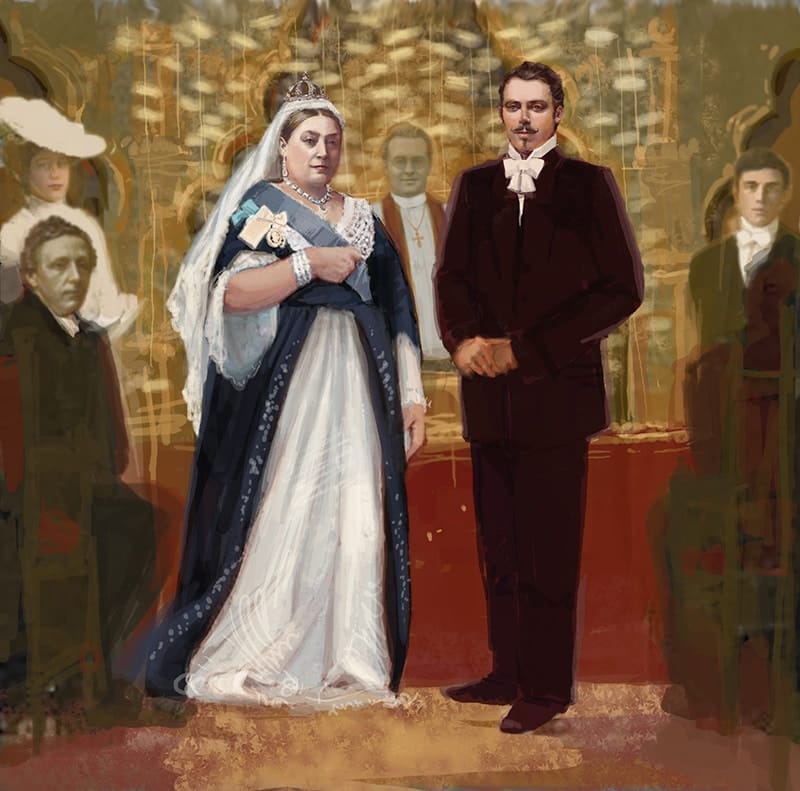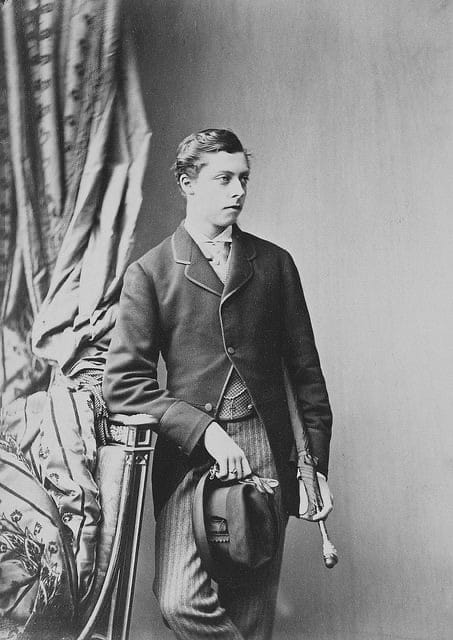Prince Leopold, Duke of Albany (1853-1884), was the eighth and youngest son of Queen Victoria and Prince Albert. Handsome, gentle, charmingly shy, he received more of his mother’s attention than he liked, and as a young man he decided that the best means for gaining his independence was through marriage.
Leopold suffered from hemophilia, however, which not only kept him from active participation in sports and the military (though he held honorary positions in the latter); it also hindered his marriage prospects. Heiresses, second cousins, and aristocratic women were all briefly candidates to be his bride. Did no one want to marry a prince just because he was a hemophiliac? What of the wealth and privilege such a union would bring? Many young ladies did aspire to the royal family, and Leopold’s illness alone wouldn’t have been enough to put them off. But for those already high in society, the rank of princess wasn’t so tempting when it meant having Queen Victoria for a mother-in-law.

With Leopold determined to marry, Victoria—as she had done with her older children—loudly, repeatedly proclaimed that offspring of British monarchs should wed royals or nobles of other nations as a means of forming political and military alliances. She would prefer that Leopold stay with her and not marry at all, but if he insisted, then his must be a union that strengthened her reputation as the “grandmother of Europe”— i.e., a union with a notable someone not from the UK.
Leopold was a great admirer of Alice’s Adventures in Wonderland, and like most of London society, he knew that Alice Liddell, daughter of Henry Liddell, Dean of Oxford’s Christ Church, had been the inspiration for the titular character. Though Alice was no longer the girl she’d been when Lewis Carroll penned his masterpiece, Leopold felt—a little rightly, a little wrongly—that because of his familiarity with the book, he knew her.
He met the twenty-year-old Alice one beautiful Saturday afternoon at Christ Church. Not near as conservative and priggish as Alice had presumed him to be, she found the prince appreciative of the satire in Carroll’s “nonsensical” novel and open-minded to her ideas for ending child labor in the kingdom. As to her notions concerning a woman’s place in society—how a woman need not be so subservient, yoked to domestic duties only—Leopold encouraged them.
If women in general were half as resourceful as Alice Liddell, he thought, the monarchy would surely benefit from their being treated as men’s equals.
“The more I’m with you, Miss Liddell,” he even admitted one afternoon, “the more I suspect women are superior to men.”
She assured him of it, and unlike with heiresses, second cousins, and aristocrats, Prince Leopold lost himself; he was in love with a commoner, an orphan of no known pedigree who had been adopted into a middle-class family, and who passionately acted upon ideas that Queen Victoria considered outlandish, even dangerous.
By marrying his beloved Alice, Leopold could do more than just gain independence from his domineering mother; he could rebel against her. This, even though the prospective bride would surprisingly prove to be, in accord with the queen’s dictate, quite a notable someone not from the UK. Alice presses on with her goal of founding an orphanage, desperate to protect children from hard labor, starvation, and violence.
Alice’s growing reputation for fighting against child labor, the prince’s love—these earn her the smoldering ire of QUEEN VICTORIA. How can the queen’s youngest son be enamored of a plainly dressed commoner? A commoner, no less, whose efforts to improve the welfare of the country’s most vulnerable population conflict with certain arrangements of providing a cheap labor force to support the aristocracy that Victoria strives politically to maintain.

No way Victoria will tolerate the upstart, Alice Liddell. Behind Prince Leopold’s back, she schemes to tear the young couple apart.
One scheme involves recruiting a gang to do away with Miss Liddell. The job falls to QUIGLY, but he has good reason not to murder the charitable Alice; he had been the very first person she met after crossing over into our realm, her best friend on Earth for a time. Every day, she contends with Jesus the gang for the theater (the site of her orphanage). And every day, the crown acts as a stealth wedge attempting to drive her and Prince Leopold apart.
It’s always easier to give in, and we might think that Alice’s life would be less troubled were she to accept a proposal of marriage and forget her do-gooder ambitions. We’d be wrong. Prince Leopold, defying his overbearing mother, proposes to Alice, and buffeted on all sides by responsibilities, other people’s hopes and expectations, she goes into something of a tailspin.
She puts off answering Leopold, knowing that, though she loves him, agreeing to become his wife will have negative implications for her work with orphans. She’s no longer naïve enough to think that the queen shares her enthusiasm for improving the children’s welfare. Nor is she unaware that the queen judges her to be an uppity no-name who’s grown from a foundling to mistakenly acting as if a woman can make her own decisions, conduct business, etc.—i.e., do everything a man can do.
By Alice’s twentieth year, Mrs. Liddell was becoming anxious for her to choose a husband from among her many suitors.
‘But I don’t feel anything for a single one of them,’ Alice complained, shaking her head to fling out the unwanted memory of a boy left behind long ago. Don’t think of him! I mustn’t!
Then, one Saturday, the Liddell family attended an outdoor concert by a quartet at Christ Church Meadow. They were about to take their seats when a young gentleman, under the pretense of introducing himself to Dean Liddell, approached. He was Prince Leopold, Queen Victoria’s youngest son, and he had been sent to Christ Church so that Dean Liddell might oversee his education. This was his first time meeting the family.
Mrs. Liddell became fidgety and excited as she was introduced. ‘And these ladies,’ said Dean Liddell, presenting his daughters, ‘are Edith, Lorina, and Alice. Girls, say hello to Prince Leopold.’
Alice held out her hand for the Prince to kiss. He seemed reluctant to let it go.
‘I’m afraid you can’t keep it, Your Highness,’ she said. And when he didn’t understand: ‘My hand. I may have use for it still.’
‘Ah. Well, if I must return it to you, then I must, though if it ever needs safe keeping . . .’
‘I shall think of you, Your Highness.’
Prince Leopold insisted that the Liddell’s sit with him. He placed himself between Alice and Mrs. Liddell, and when the concert began with a Mozart medley, he leaned over and whispered in Alice’s ear, ‘I don’t fancy medleys. They skip lightly over so many works without delving thoroughly into any one of them.’
‘There are quite a few people like that as well,’ Alice whispered in return.
Mrs. Liddell, not hearing this exchange, flashed her daughter a look, which Alice was at a loss to interpret. The Prince talked to her through the entire concert, discussing everything from art to politics. He found Miss Liddell unlike other young women, who spoke of nothing but velvet draperies, wallpaper patterns and the latest fashions, women who batted their eyelashes and expected him to swoon. Miss Liddell didn’t try to impress him – indeed, she gave the impression that she didn’t much care what he thought of her and he rather admired that. And her beauty . . . yes, her beauty was undeniable. All in all, he thought her a delectable puzzle of a creature.
No sooner was the concert over and Leopold gone than Mrs. Liddell voiced what she’d been trying to communicate to Alice with her eyes.
‘He’s a prince! A prince! And he’s taken a fancy to you, I’m certain!’
‘We were only talking, Mother. I talked to him as I would have talked to anyone.’
But her mother’s awe and enthusiasm were difficult to ignore, and she started running into Leopold all over town. If she strolled through the Christ Church Picture Gallery, she found him gazing intently at an oil painting by one of the old masters. If she visited the Bodleian Library, she found him thumbing through a volume of Gibbon’s The History of the Decline and Fall of the Roman Empire (which she had read in its entirety). He’s handsome enough, I suppose. And obviously well bred. Yes, but so were many of the men who vied for her attention. But at least he didn’t stroke his moustache with impatience as she talked of the need to provide for Britain’s poor.
‘A nation should be judged on how it looks after its more unfortunate children,’ she explained. ‘If Great Britain is truly to be the greatest kingdom in the world, it is not enough to flaunt our military power and our dominance in industry. We must lead by example and be more charitable to and protective of our own.’
Prince Leopold always listened to her judiciously, weighing her arguments and reasonings with seriousness. He never agreed or disagreed with her.
Mother may be right. I could certainly do worse than marry a prince. But although Alice tried to feel something for the man, her heart remained unconvinced.

Three months after the concert at Christ Church Meadow, while taking a ride in his carriage to Boar’s Hill, Prince Leopold said, ‘Your father tells me that you’ll be visiting the Banbury Orphanage tomorrow afternoon. I’d like to come along if you’ll have me. One never knows what sort of troubles might beset a young woman there.’
‘If you think it best, Your Highness.’
He offered to take her in the carriage, but Alice said that she’d prefer to walk.
‘You see so much more of the town when you walk – a little curiosity shop or a snatch of garden where you wouldn’t think it possible to have a garden, choked as it is by city things. In a carriage, you hurry past these treasures without noticing them.’
She didn’t take the slightest quirk of mankind for granted but viewed it as a small miracle and cause for celebration, and the prince had begun to love her for this.
At Banbury, the orphans crowded around Alice, hugging her skirts, all shouting at once. Alice laughed, held four conversations simultaneously and, to Leopold’s eye, set off against the soot-stained walls, the drab and loose-hanging clothes of the orphans and the pale bloodless faces of the wardens, she looked more radiant than he’d ever seen her. On a tour of the orphanage, a train of children following at their heels, one young boy refused to let go of Alice’s left thumb.
Alice requested a thorough accounting of the troubles facing the Banbury Orphanage. The wardens pointed out floors rotten from overflowing sewage, the sagging infirmary roof, the time-worn mattresses as thin as wafers. They showed her the pantry, empty save for sacks of dried kidney beans and uncooked rice.
‘The children have had nothing but beans and rice for two weeks,’ one of the women told her. ‘We were supposed to be getting a supply of beef ribs, but so far . . . nothing. This sort of thing happens rather frequently, I’m afraid.’
Prince Leopold had been silent for some time. He cleared his throat. ‘What of the warden responsible for ensuring that Banbury receives the food and clothes the children need?’
‘The chief warden is very selective as to who gets what and how much of it, Your Highness,’ the warden explained. ‘He says we take in too many children and that perhaps they are not so deserving. For example, that one there . . .’ the warden pointed at the boy holding on to Alice’s thumb ‘. . . he has a real talent for thieving, though often as not what he steals is food because of how hungry he is. They all are.’ She gestured at the surrounding orphans.
Alice looked at the boy clutching her thumb, reminded of Quigly Gaffer. What’s become of him? And the others? Andrew, Margaret, and Francine, hardly old enough to dress themselves, never mind living on the streets without the love and support of family.
The mournful, faraway look on Alice’s face had a profound effect on the Prince. ‘I shall talk with the Queen,’ he said after several moments. ‘I think we might establish a Commission of Inquiry into the matter and, in the meantime, arrange for an increase in food rations. How does that sound?’
‘It sounds like generosity rarely met with among the living,’ said the woman.
‘Well, no one here shall soon discover if it’s to be met with among the dead either, if I can help it.’
The orphans blinked and said nothing, hardly believing what they had heard: Queen Victoria and Prince Leopold were going to work on their behalf! The wardens offered the Prince their thanks many times over, while Alice looked on and smiled, which was all the thanks he desired.
On the walk home, they stopped to rest in the university’s Botanic Garden, where Alice found herself sitting on a bench with Leopold suddenly kneeling in front of her.
‘No matter what you decide, Alice,’ he was saying, ‘I want you to know that in the coming years I will be only too glad to assist you in your charitable endeavors. But I hope with all my heart that you’ll allow me to do so as your husband.’
Alice didn’t understand.
‘I’m asking for your hand in marriage,’ Leopold explained. ‘But . . . Your Highness, are you sure?’
‘That is not exactly the answer for which I was hoping. Alice, you are a most uncommon commoner, to say the least, and I would be proud to call myself your husband. Of course, you realize that you will not have the title of Princess, nor be entitled to ownership of the royal estates?’
‘Of course.’ Marriage? Again, she felt the tug of a long-buried affection for one who . . . No no no! Think of other things. Be realistic. The marriage would please her mother. She would do it for her mother, for her family’s sake. ‘I accept, Leopold.’
She let herself be kissed, feeling the coolness of dusk settle in around her.
‘I have already spoken with the Queen and I have asked for, and received, your father’s blessing,’ the Prince said. ‘We shall host a party to announce the engagement.’
If she’d had time to think about it, Alice might have stopped herself, considering the idea too whimsical. But the words had a force of their own, and only after she said them aloud did she realize just how appropriate the idea was.
‘Let’s have a masquerade.’
Yes, it felt right: a masquerade to celebrate the orphan girl’s impending marriage to Prince Leopold of Great Britain.